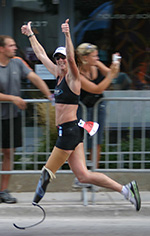Professor Otto and staff and student colleagues have done work with the famed amputee athlete, Amy-Palmiero Winters.
NO EXCUSES Guiding an Amputee Runner across the Finish Line
 In 1994, Amy Palmiero-Winters, a competitive runner who finished the Boston Marathon in three hours and 16 minutes, lost her left leg below the knee in a motorcycle accident.
In 1994, Amy Palmiero-Winters, a competitive runner who finished the Boston Marathon in three hours and 16 minutes, lost her left leg below the knee in a motorcycle accident.
She underwent 25 surgeries following her accident—a brutal experience—and yet was determined to reach her former condition and compete again. With state-of-the-art running blades from A Step Ahead Prosthetics (ASAP) in Hicksville, New York, and guidance from Adelphi Professor Robert Otto, Ms. Palmiero-Winters is back at the peak of her sport.
After meeting ASAP owner, Erik Schaffer, Ms. Palmiero-Winters left her job as a welder in Meadville, Pennsylvania, to work for him in exchange for running blades that each cost about $25,000. When Dr. Otto, a professor of health studies, physical education, and human performance science, came to ASAP to conduct research on prosthetic athletes on behalf of Long Island Tri Coach, which pairs triathlon competitors with coaches and trainers, Ms. Palmiero-Winters asked him for help in designing her training program for the 24-Hour World Championships in Brive, France, which took place in May 2010.
She is the first amputee to qualify for a U.S. national track and field team and helped the women’s team finish fourth.
For 30 years, Dr. Otto has directed Adelphi’s Human Performance Laboratory, where professors and graduate students explore what makes athletes powerful and how to help them improve their performance. The recently renovated lab uses diverse equipment and technology to assess athletes’ strength and fitness levels. In conjunction with ASAP, Dr. Otto has also studied and trained amputee-athletes, using biomechanical software to test the efficiency of prosthetics and the athletes who use them.
Ms. Palmiero-Winters’s inability to run on consecutive days because of the impact and friction on her residual limb posed a challenge for both athlete and coach in training for the 24-hour race. Whereas Dr. Otto would normally oversee training for six or seven days a week, he only worked with Ms. Palmiero-Winters for four or five of those days, with rest periods between extended runs. Despite Ms. Palimiero-Winters’s dedication to the race and drive to train as much as possible, these rests were necessary to keep her from injuring herself.
Dr. Otto’s highly individualized approach to training enabled him to respond to Ms. Palmiero-Winters’s unique needs and to understand that she has plenty of what makes a great athlete: grit and determination.
“Each athlete is different,” Dr. Otto says. “You have to treat each one as an individual, and Amy is special because she is extremely highly motivated. Pain is not part of her vocabulary.” If Dr. Otto had not made rest days mandatory to prevent injury to Ms. Palimiero-Winters’s residual limb, he says, she would have run as much as possible, regardless of any pain she felt.
With a slew of successful marathons, triathlons, and Iron Man competitions behind her, Ms. Palmiero-Winters, with Dr. Otto’s aid and expertise, has become the embodiment of ASAP’s motto, “Live life without limitations.
For further information, please contact:
Todd Wilson
Strategic Communications Director
p – 516.237.8634
e – twilson@adelphi.edu